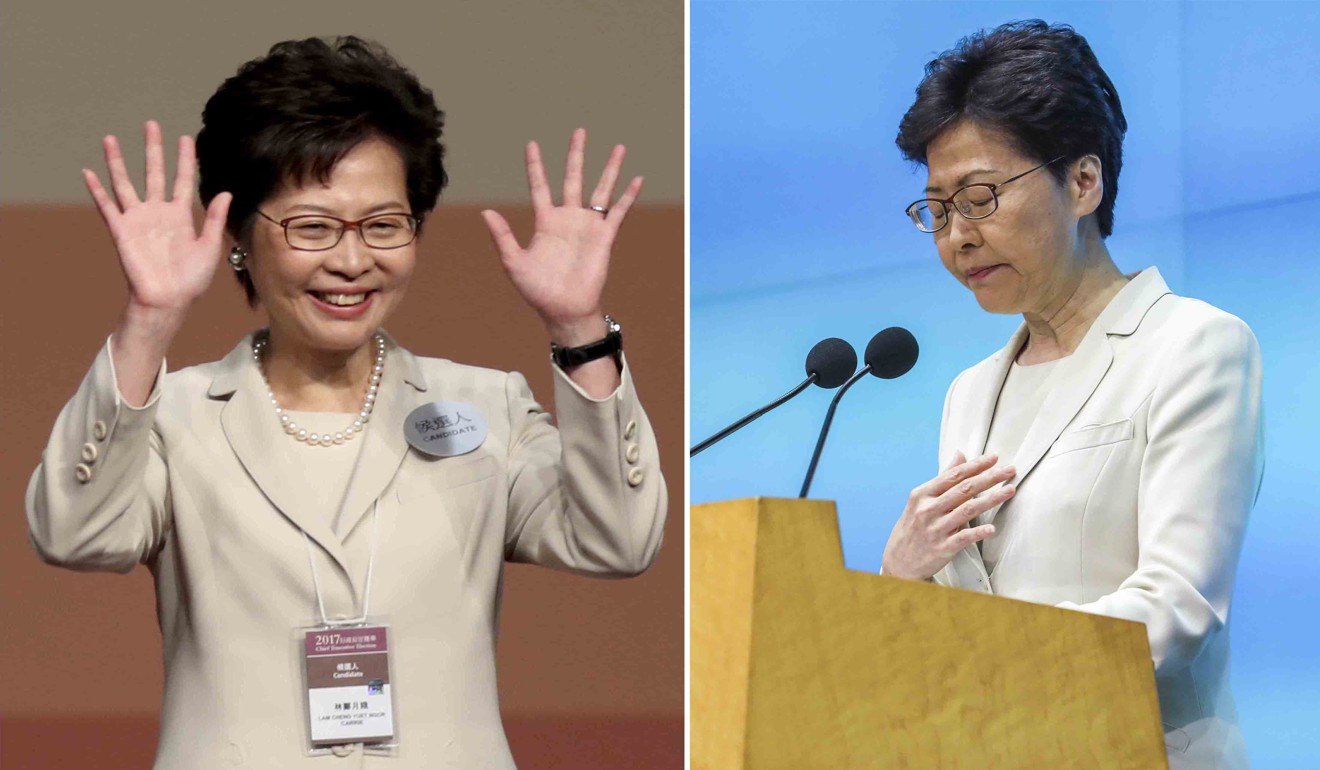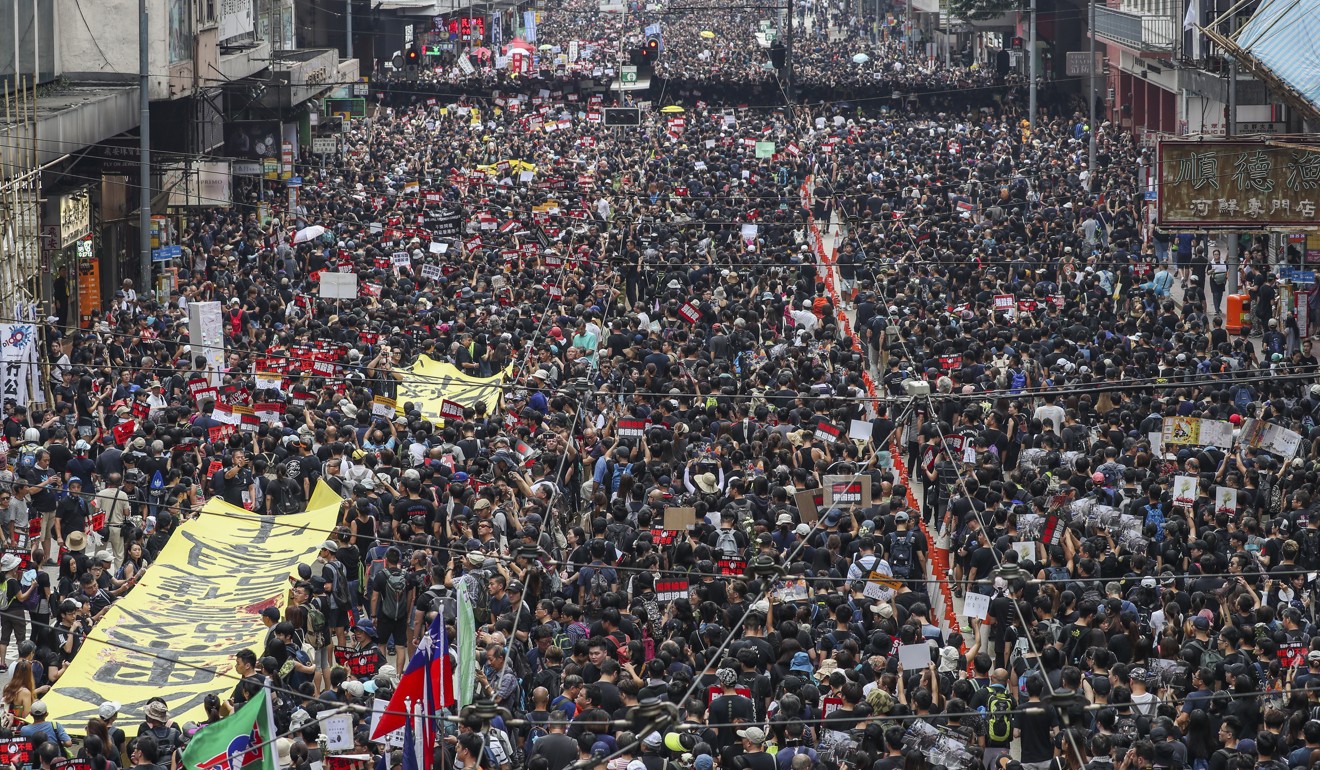
Can Carrie Lam reboot her political career after Hong Kong extradition bill crisis?
- From top job to new low in two years as Lam offers ‘most sincere and solemn apology’ for mishandling extradition bill that sparked two massive marches
- With echoes of statement she made when she became city leader, and wearing an identical cream skirt suit, Lam vows to work even harder to secure public support
Hong Kong leader Carrie Lam Cheng Yuet-ngor looked sombre as she walked onto the stage on Tuesday, with barely a trace of her usual trademark confidence bordering on brusqueness.
In a slightly shaky voice, she offered her “most sincere and solemn apology” for mishandling the much despised extradition bill that had sparked two massive marches and a round of violent clashes in just a week.

“I personally have to shoulder much of the responsibility,” said Lam, who paused and looked down at her script as she delivered her long-awaited personal apology. Contrary to advice some had whispered in her ear and others had willed aloud, she did not bow.
‘I have heard you loud and clear,’ Lam tells city in ‘most sincere’ apology
Her close allies said these were demands impossible to meet. They admitted her latest remarks were likely to do little to salve the feelings of ordinary Hongkongers.
Yesterday our police chief justified us to use weapons to suppress the rioters, the next day he overruled it … It’s like slapping his own face
The apology, a government source revealed, had been discussed at a high-level meeting held by Lam and top officials including Chief Secretary Matthew Cheung Kin-chung, Financial Secretary Paul Chan Mo-po and Secretary for Justice Teresa Cheng Yeuk-wah at Government House on Monday.
Police chief steps back from riot label as Carrie Lam keeps low profile

This U-turn had affected police, sources said. A veteran inspector, who was not deployed to handle the unrest, accused Lo of “bowing to pressure” to appease the public. “Yesterday our police chief justified us to use weapons to suppress the rioters; the next day he overruled it,” the source said. “It’s like slapping his own face.”
It takes a long while to establish your reputation but it could be ruined by just one single move. That is politics
In her letter to civil servants on Tuesday evening, Lam acknowledged the difficult position she had placed the force in: “For police colleagues, I am indebted to them for their devoted service as always and am saddened to see the tension caused between police officers and protesters. For everyone of you, the anxiety caused is deeply regretted.”
Hong Kong leader’s tough style blamed for fuelling protests
Lam also admitted she would have to redouble her efforts to work with young people and reach out to different sectors of society. For now, political scientist Dr Chung Kim-wah said, Lam’s statements on Tuesday would do little to appease her critics, especially as she had failed to answer plainly questions over her tenure which were beyond her purview.
“In the Communist Party’s circle, it is not up to you to resign, you can only be kicked out,” Chung said.
But Lam’s firm stance in not acquiescing to all of the protesters’ demands and yet removing some of the heat also presented the pro-democracy camp with a problem, Chung said. It would be difficult for them to call for another mass protest for the third straight Sunday.
Ip Kwok-him, one of Lam’s advisers in the Executive Council, said the chief executive would have to show the public she had truly learned her lesson as the bitter row had wiped out her achievements of the past two years.

In the past week, Lam and her advisers had emphasised her work on youth and education policies, as well as her plan to boost the city’s technological innovation as proof of her track record. “It takes a long while to establish your reputation but it could be ruined by just one single move,” Ip said. “That is politics.”
On Tuesday, in making her apology, Lam also pledged: “I am still committed, passionate and I will work even harder. I hope I can secure the support from the public.”
The statement had echoes of a promise she made on her election day, when she said: “I see my shortcomings and understand that I must put in more effort.”
Similarly, that same cream skirt suit on Tuesday might have been an unintentional harking back to that first day when she was elected. And it delivered its own message: If Lam’s first attempt to defuse the crisis was to hit pause on the bill, her latest appearance was to hit the reboot button on her political career.
Additional reporting by Gary Cheung and Olga Wong

